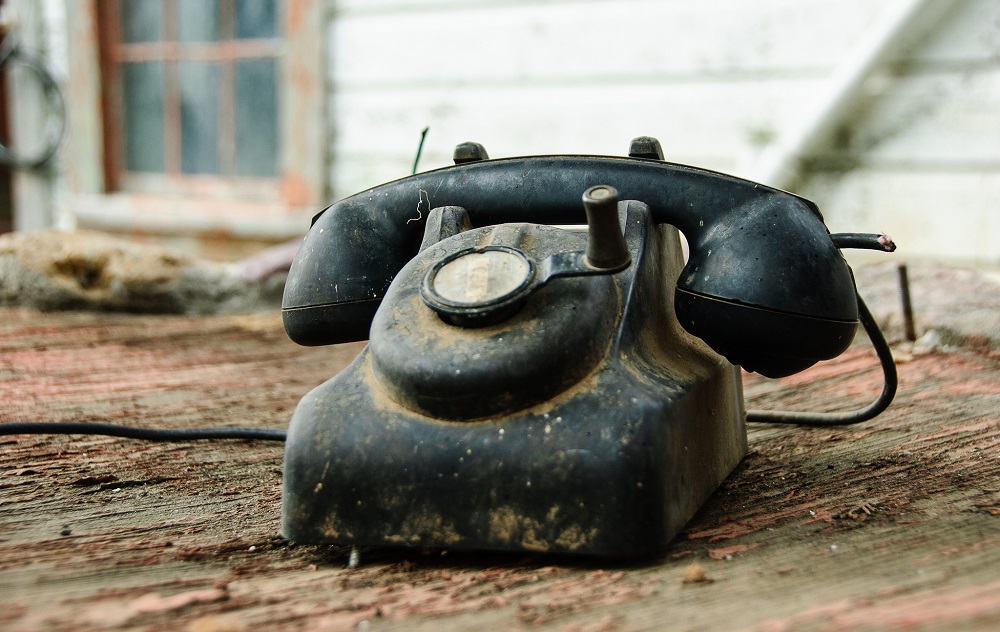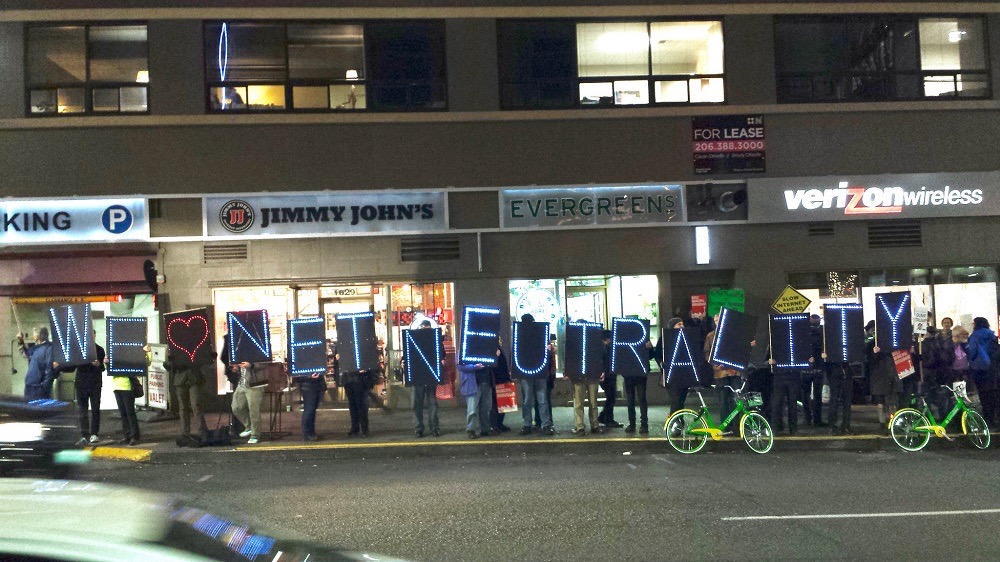Why VoIP was recognized as an information service in the USA, and what it means for the telecom industry and users
The rules of net neutrality in the United States were abolished in June of this year, but the status of IP telephony in the new legislation remained unclear. It was not clear who should set tariffs for this service - the state or telecommunications companies. But in early September, the US Court of Appeals for the Eighth Circuit recognized VoIP as an information service, transferring its regulation “into the hands” of operators.
Under the cat we tell how this decision will affect ordinary Internet users and what it means in the context of the ongoing struggle for network neutrality.

/ Flickr / Loren Kerns / CC
IP telephony has caused disagreements between telecommunications operators and regulators for several years. State authorities claim that the Internet telephony service is similar to fixed and mobile communications, because VoIP services are rightly considered telecommunications.
This is important, since in this case IP-telephony (as well as ordinary telephone services) falls under the second part (Title II) of the American Communications Act of 1934 . According to it, providers are obliged to provide all subscribers with the same services at the same price, which should not depend on the client’s income or its location.
Also, by law, the state government may force a telecommunications company to buildnetwork in rural areas or to finance social programs - all in order to provide equal access to services for all subscribers.
Operators, in turn, seek to completely abandon fixed telephone lines and switch to Internet telephony and insist that VoIP services are an information service. In this case, the first part (Title I) of the Law on Communications, which implies more freedoms for providers (including free pricing), will be responsible for its regulation.
To reinforce their point of view, VoIP-operators say that they use the infrastructure of Internet providers to organize the work of the service. For this reason, IP-telephony, allegedly, is different from the classical telephony, because it must obey other rules.
It does not suit the power of individual states. They are worried about the fact that providers will no longer serve the sparsely populated territories of the country, since this will be unprofitable. All disagreements had to be resolved in court. One of the last hearings on this issue was held in Mississippi.
Initially, an IP telephony status dispute arose between the Minnesota government represented by the Public Services Commission (Minnesota Public Utilities Commision) and telecommunications company Charter Communications. The state organization sued Charter on account of its decision to provide IP telephony services through a separate firm. Thus, the telecommunications giant allegedly wanted to avoid strict rules for regulating telephone services.
The lawsuit on determining the status of VoIP passed through several instances, until, finally, the appeals court of the eighth district of the United States in September put an end to this matter. Judicial conclusionstates that VoIP is an information service. The decision is connected with the fact that the service transforms and transmits information through a special adapter, without which IP-telephony is incompatible with classical telephone networks.
It is not yet known for certain whether IP telephony will be considered an information service at the state level. For example, earlier the status of VoIP communications was discussed in the Vermont Supreme Court. Then the case was won by the state government, which defended its right to regulate IP telephony services. Comcast, Verizon and AT & T disagreed with this decision. Perhaps the precedent in Minnesota will give them a reason to challenge the situation with VoIP-connection in Vermont.
The Minnesota Court ruling also prompted the FCC to decide to regulate VoIP issues. Shortly after the ruling on the need to recognize the “informational” status of IP telephony at the national level, wroteFCC Commissioner Michael O'Rielly. He was supported by the head of the FCC and Ajit Pai (Ajit Pai), he said , the differences in the laws of different states impede innovation in communication technologies.
It can be expected that in the near future there will be more similar court sessions in the USA. This is in view of the fact that the authorities of individual states are still opposing the abolition of net neutrality by a decision of the FCC. And the recognition of VoIP information service is another point in favor of the Federal Commission.

/ Flickr / Backbone Campaign / CC
To date, Hawaii, New Jersey, Vermont, Rhode Island, New York, and Montana passed the law, which restored net neutrality throughout the state. California also adopted its law, which caused discontent of the Federal Ministry of Justice. On the day the decree was signed, the Ministry filed a lawsuit against the state government, which will now defend the law in court. Prosecutor Generals of 22 states are also fighting for net neutrality .
Probably, now they will have to oppose the decisions of the courts related to the "informatization" of VoIP. Although against the FCC policy advocatesmore than half of the US states, there is a high probability that the Federal Commission will be able to recognize IP-telephony information service at the state level, since the court in Minnesota has created a precedent. What comes out of this is to be seen in the near future.
PS Several posts from the corporate blog VAS Experts:
PPS Our Neutrality Series:
Under the cat we tell how this decision will affect ordinary Internet users and what it means in the context of the ongoing struggle for network neutrality.

/ Flickr / Loren Kerns / CC
Background question
IP telephony has caused disagreements between telecommunications operators and regulators for several years. State authorities claim that the Internet telephony service is similar to fixed and mobile communications, because VoIP services are rightly considered telecommunications.
This is important, since in this case IP-telephony (as well as ordinary telephone services) falls under the second part (Title II) of the American Communications Act of 1934 . According to it, providers are obliged to provide all subscribers with the same services at the same price, which should not depend on the client’s income or its location.
Also, by law, the state government may force a telecommunications company to buildnetwork in rural areas or to finance social programs - all in order to provide equal access to services for all subscribers.
What do telecom operators want?
Operators, in turn, seek to completely abandon fixed telephone lines and switch to Internet telephony and insist that VoIP services are an information service. In this case, the first part (Title I) of the Law on Communications, which implies more freedoms for providers (including free pricing), will be responsible for its regulation.
To reinforce their point of view, VoIP-operators say that they use the infrastructure of Internet providers to organize the work of the service. For this reason, IP-telephony, allegedly, is different from the classical telephony, because it must obey other rules.
It does not suit the power of individual states. They are worried about the fact that providers will no longer serve the sparsely populated territories of the country, since this will be unprofitable. All disagreements had to be resolved in court. One of the last hearings on this issue was held in Mississippi.
Court decision
Initially, an IP telephony status dispute arose between the Minnesota government represented by the Public Services Commission (Minnesota Public Utilities Commision) and telecommunications company Charter Communications. The state organization sued Charter on account of its decision to provide IP telephony services through a separate firm. Thus, the telecommunications giant allegedly wanted to avoid strict rules for regulating telephone services.
The lawsuit on determining the status of VoIP passed through several instances, until, finally, the appeals court of the eighth district of the United States in September put an end to this matter. Judicial conclusionstates that VoIP is an information service. The decision is connected with the fact that the service transforms and transmits information through a special adapter, without which IP-telephony is incompatible with classical telephone networks.
What to expect in the aftermath
It is not yet known for certain whether IP telephony will be considered an information service at the state level. For example, earlier the status of VoIP communications was discussed in the Vermont Supreme Court. Then the case was won by the state government, which defended its right to regulate IP telephony services. Comcast, Verizon and AT & T disagreed with this decision. Perhaps the precedent in Minnesota will give them a reason to challenge the situation with VoIP-connection in Vermont.
The Minnesota Court ruling also prompted the FCC to decide to regulate VoIP issues. Shortly after the ruling on the need to recognize the “informational” status of IP telephony at the national level, wroteFCC Commissioner Michael O'Rielly. He was supported by the head of the FCC and Ajit Pai (Ajit Pai), he said , the differences in the laws of different states impede innovation in communication technologies.
It can be expected that in the near future there will be more similar court sessions in the USA. This is in view of the fact that the authorities of individual states are still opposing the abolition of net neutrality by a decision of the FCC. And the recognition of VoIP information service is another point in favor of the Federal Commission.

/ Flickr / Backbone Campaign / CC
To date, Hawaii, New Jersey, Vermont, Rhode Island, New York, and Montana passed the law, which restored net neutrality throughout the state. California also adopted its law, which caused discontent of the Federal Ministry of Justice. On the day the decree was signed, the Ministry filed a lawsuit against the state government, which will now defend the law in court. Prosecutor Generals of 22 states are also fighting for net neutrality .
Probably, now they will have to oppose the decisions of the courts related to the "informatization" of VoIP. Although against the FCC policy advocatesmore than half of the US states, there is a high probability that the Federal Commission will be able to recognize IP-telephony information service at the state level, since the court in Minnesota has created a precedent. What comes out of this is to be seen in the near future.
PS Several posts from the corporate blog VAS Experts:
- How to implement IPv6 - FAQ for Internet providers
- DDOS and 5G: thicker "pipe" - more problems
- Firewall or DPI - protection tools for different purposes
- IPv6 protocol - from theory to practice
PPS Our Neutrality Series:
